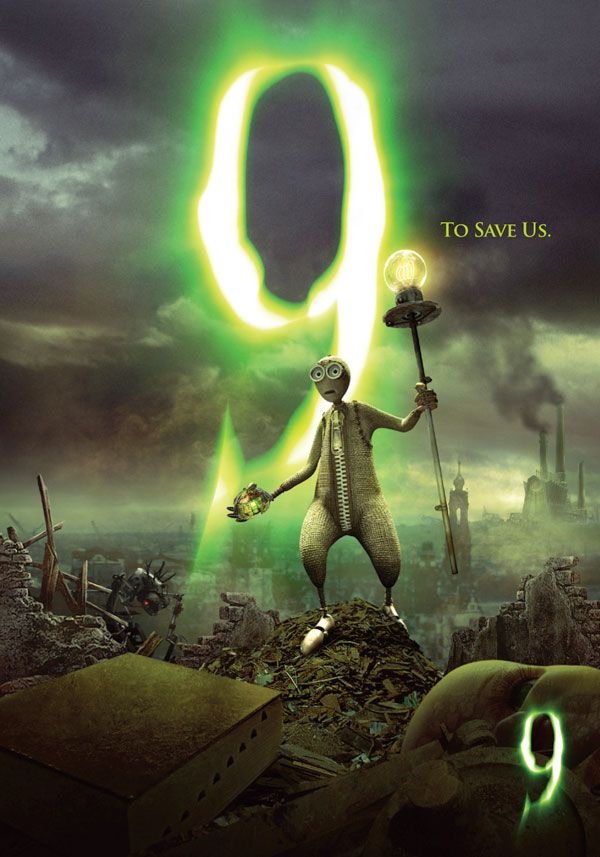 “9” is an extraordinary piece of animation that is simply outstanding to behold. There are certainly things to nitpick, but when seemingly every week there is another remake or sequel, it is a relief to see something unique.
“9” is an extraordinary piece of animation that is simply outstanding to behold. There are certainly things to nitpick, but when seemingly every week there is another remake or sequel, it is a relief to see something unique.Director Shane Acker has expanded his Oscar nominated 10-minute short of the same name to feature length with the help of producers Tim Burton and Timur Bekmambetov (“Wanted”). The dialogue-less short can easily be found on YouTube and is worth checking out. It is interesting to see how the kernel of an idea was more completely flesh out, even if not all the extra meat is necessary.
The film is set in a world that has been destroyed in a battle between man and machine. All life has been eliminated except for nine rag dolls created by the same inventor who made the first machine that set the world to its destruction.
As the movie opens we meet 9 (voiced by Elijah Wood), the newest and final doll to be created. He quickly meets up with the others and discovers them to be an assortment of new friends and foes.
The world that Acker has created and the struggle between these surprising sympathetic and emotive dolls and the animal-like machines is so compelling in itself that it overcomes the less-than-amazing screenplay that Pamela Pettler (“Monster House,” “Corpse Bride”) has written.
The arc of the story is fine. It is just that that in padding a 10-minute short to 80 minutes there’s a lot of clichés thrown into kill time. The dolls are more archetypes than full-fledge characters and the dialogue they are given hardly original.
The short was fine without dialogue and it would’ve been a bold move to go wordless for the feature length version, but also would’ve made the film a tough sell.
Credit though to an excellent voice cast that includes Christopher Plummer, John C. Reilly, Jennifer Connelly, Crispin Glover and Martin Landau. Everyone involved gives lively voice performance that truly breath life into these characters in spite of the limitations of the script.
Although the screenplay hits familiar notes, the visuals and style of the film is enthralling. The computer animation here is truly amazing and makes the film absolutely worth seeing, especially on a big screen.
The look blends imagery that recalls the war torn ghettos of War World II with a bizarre hybrid of Soviet and Nazi iconography. It is post-apocalyptic world as we’ve seen in film before and yet at the same time something that feels new.
Once the stage is set, the film is almost non-stop action with brief interludes for the audience to catch their breath. The action sequences are impeccably well executed. There’s a certain amount of grace and genuine ingenuity to these scenes which are both clever and thrilling.
There are little moments and ideas that also raise the film above the ordinary. The way one of the dolls uses a magnet to magnetize parts of his head and give himself a high is a small detail that certainly doesn’t further the story, but helps more fully realize Acker’s world.
This may be an animated feature, but it isn’t kid stuff. The film is rated PG-13 and for good reason. For older children, “9” is fine, but the dark tone and monstrous machines will scare younger viewers.
 “Extract” — “Beavis and Butthead” and “King of the Hill” creator Mike Judge’s latest film — is a box office dud, but given his track recorded that is almost an audience seal of approval.
“Extract” — “Beavis and Butthead” and “King of the Hill” creator Mike Judge’s latest film — is a box office dud, but given his track recorded that is almost an audience seal of approval. If “(500) Days of Summer” had to be given a label it would be romantic comedy, but that doesn’t really fit and implies all sorts of things that the film is not. Romantic comedies have a clear formula and expectations, but as the film’s narrator notes early on: “This is a story of boy meets girl. But you should know up front, this is not a love story.”
If “(500) Days of Summer” had to be given a label it would be romantic comedy, but that doesn’t really fit and implies all sorts of things that the film is not. Romantic comedies have a clear formula and expectations, but as the film’s narrator notes early on: “This is a story of boy meets girl. But you should know up front, this is not a love story.”